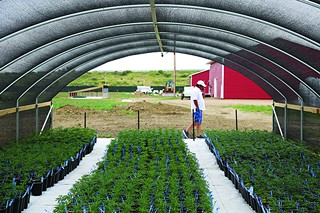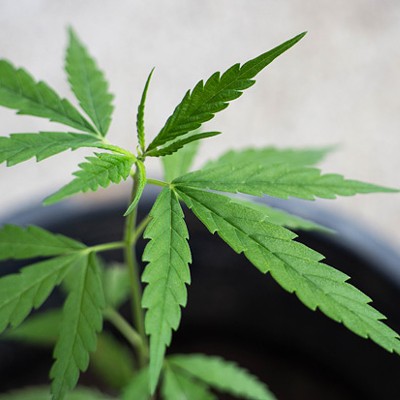Editor's note: As rural Central Oregon grapples with whether or not—and how—to allow marijuana-related business, we take a look at the industry's growth in rural Colorado.
Mark Morley looks out over 30 acres he owns east of Pueblo, Colorado, and imagines the future. On this blustery summer afternoon in early summer, there's little more than mud and puddles here, bordered by highway and railroad tracks and flanked by farm buildings and rolling hills. But by the end of September, if all goes well, he'll be looking at a pungent green thicket, as 14,400 marijuana plants reach their full 8-foot height. It's one of several major outdoor grows launching this summer in Pueblo County. Eventually, Morley plans to expand onto another 1,500 acres, investing in greenhouses and processing facilities able to handle 40,000 plants.
Morley, 55 and dressed in jeans, a flannel shirt, and a Tigers baseball cap, is a major Colorado Springs real estate developer. After a marijuana dispensary opened in one of his buildings, he realized how lucrative the business could be. "Why," he wondered, "am I not doing this myself?" If he planted corn on this land, each acre would require approximately 2.2 acre-feet of water per year and produce $768 in annual sales, according to Rachel Zancanella, a Pueblo-based Colorado Division of Water Resources engineer. That same acre planted with marijuana would require roughly 2.65 acre-feet of water — and gross Morley $6 million.
Welcome to the big business of rural weed. Ever since the local steel industry collapsed in the 1980s, Pueblo County has been seeking an economic savior. It's not completely unlike Deschutes County, which relies on tourism and beer production, but has been shopping for an agriculture economic footing ever since logging declined three decades ago. Nearly a third of Pueblo County's population is on public assistance, and in 2010, the metropolitan area around its eponymous city had the highest unemployment rate in the state. When Colorado voters passed Amendment 64 in 2012, paving the way for legalized marijuana, the county commissioners saw a chance for revival. They hired Brian Vicente, the Denver lawyer who helped write the ballot initiative, to craft rules for growing and selling pot outside city limits.
As a result, about 50 entities—including Morley—are now licensed or conditionally approved to do so in the county. "Historically, the biggest opponent of marijuana reform has been the government," Vicente says. "Here, the tables have turned. No one else in history has taken as comprehensive a look at establishing marijuana business laws." Pueblo County's economy, he adds, "has gone through the roof."
But, like Deschutes County, the area's relationship with pot remains ambivalent—with many civic leaders resistant to the idea and some residents worrying that the county's latest growth industry is bringing social problems along with money, and others doubt whether the bold experiment will reap the promised rewards.
Just like Oregon's ballot initiative, Amendment 64 ultimately gave local governments the power to decide whether and how to permit recreational pot within their communities. The Pueblo City Council, for example, banned recreational pot shops and grows within city limits. It reacted similarly when medical marijuana was legalized in 2000, placing a moratorium on dispensaries. The Colorado Marijuana Enforcement Division's 2014 annual report says that 228 local jurisdictions have voted to prohibit medical and retail marijuana operations.
Pueblo County, however, rolled out the welcome mat. "[Marijuana] stores don't require a lot of space, but indoor grow operations can," says Pueblo County Commissioner Terry Hart. "And Pueblo County got hit pretty hard in the recession, so we had a lot of empty commercial buildings throughout the county that realtors were trying desperately to fill." Like some other pot-friendly communities, the county made marijuana businesses a "use by right" in industrial and business districts—meaning they weren't subject to sometimes time-consuming and arduous special reviews or approvals by the local government.
But Pueblo County offered something beyond cheap real estate. Unlike Denver—or, say, Portland—it has an abundance of available agricultural land. So local officials made marijuana cultivation a use by right there, too—likely the first Colorado county to do so, according to Vicente and Joan Armstrong, Pueblo County's planning director.
The county has also issued pioneering rules that prohibit hemp grows with male plants from being located within five miles of existing marijuana grows. This prevents cross-pollination that could lower the marijuana plants' THC content while increasing THC in the hemp, which can't exceed 0.3 percent under state law.
Even the Pueblo Board of Water Works, the local utility that leases water for business and agricultural use, is trying to accommodate the industry. Last year, when the Bureau of Reclamation explicitly prohibited the use of federal water for pot cultivation, water board employees calculated that they could lease up to 800 acre-feet of raw water to marijuana cultivators without running afoul of the feds. "This was completely new territory for us," says resources manager Alan Ward, who notes 92 acre-feet of the so-called "marijuana" water was already under contract as of this May. "When Amendment 64 was first passed, I didn't put much thought into how it was going to affect my job. But for a few months, it seemed like it was nearly all I was focused on."
The new rules are more than paying for themselves: In 2014, the county netted $1.8 million from licensing fees for pot establishments and marijuana sales taxes, covering the cost of its virtual marijuana "department" and boosting its general fund. Since marijuana remains illegal at the federal level, most banks are still cagey about allowing pot businesses as customers; that means county staff have gotten used to owners plopping tens of thousands of dollars in cash on their desks. Pueblo County Director of Economic Development Chris Markuson says charter buses filled with Wall Street investors have been touring local farmland, and there's talk of branding "Pueblo-grown pot," along the lines of Pueblo green chile, another celebrated local crop.
Real estate prices are rising, too. Industrial properties have nearly doubled in price to $50 per square foot just since 2014, says local realtor Kendall Curtis, and now that the first outdoor grows and greenhouses are materializing, agricultural land prices have doubled to up to $10,000 an acre. All in all, the Southern Colorado Growers Association, the local marijuana trade organization, claims the industry has provided 1,300 new jobs and contributed more than $120 million to the local economy.
The county is also hoping to attract marijuana testing labs and processing plants. "Pueblo could be the Silicon Valley of marijuana," says Markuson. He'd prefer that to becoming a Napa Valley clone: The county wants to export its products, not host busloads of marijuana tourists. Former growers association president Tommy Giodone is a Pueblo native, restaurateur and rodeo organizer who hosts an annual country music festival east of the city. He opened a dispensary nearby, but he doesn't smoke pot. "I'm 49 years old," he says. "Once they legalized it, I wasn't going to be like, 'Woo-hoo, I'm going to be a pothead.'"
The fact that Pueblo County wants to keep a fairly low profile hasn't appeased the industry's critics, though. Marijuana hearings are heated, county commissioners have received threatening phone calls, and growers worry that some zealot with a crop duster could devastate the outdoor harvest. "Our commissioners rushed headlong into this without consulting the county [residents]," complains Pueblo for Positive Impact's Paula McPheeters. That allowed a glut of marijuana stores and indoor grows to spring up in Pueblo West, the unincorporated suburb where she lives.
The growth has come at a steep social cost, McPheeters and other critics say. Marijuana-related crimes, including the 2014 armed robbery of a marijuana shop, have increased, according to Undersheriff J.R. Hall. Meanwhile, local affordable housing organizations and shelters have been flooded with families who traveled here hoping to find jobs. In the first four months of 2015 alone, 306 households relocated to Pueblo because of marijuana, says Anne Stattleman, who directs a nonprofit housing assistance organization called Posada. "It is not easy to get a good-paying job in the pot industry," Stattleman says. "Many people can't pass the background checks and other checks needed."
And the problems could have repercussions far beyond Pueblo County. In February, a local couple filed a lawsuit in U.S. District Court, claiming that the pot grow next door devalued their property. It's one of two lawsuits aimed at striking down Colorado's system on the grounds that it conflicts with federal drug laws.
Even if the state laws stand, Pat Oglesby, a tax attorney who studies marijuana at the Center for New Revenue in North Carolina, isn't sure how much Pueblo's head start in the reefer race will ultimately pay off. A 2015 report he co-authored concluded that roughly 20,000 acres of pot would supply the entire U.S. market. "It sounds like they have a plan to really have a huge amount of supply while other jurisdictions aren't licensing any growers, so you could see the county gaining a short-term advantage and having a huge market share," says Oglesby. "Whether that is an advantage that can be kept over time, I don't know."
In the meantime, the tiny town of Boone, population 339, in eastern Pueblo County, seems grateful for the boost. Entrepreneurs Mark Morley and Jeff Ayotte, a food-plant developer originally from the East Coast, stop in Boone one afternoon for lunch after comparing notes on their developing grow operations. Ayotte bought a nearby 500-acre ranch, where he's spent $6.6 million installing the first of 16 cutting-edge, large-scale greenhouses that will require 150 employees. He already has several "Boonies," as he calls them, on his crew, and he's paying some of them to fix up the town's century-old Veterans of Foreign Wars building, where Morley and Ayotte dine on frozen pizzas and Dos Equis beers at the bar.
Yes, there's still a sign on the VFW's wall declaring a zero-tolerance policy for drug use, but bartender Edna Rivera doesn't flinch as the two pot barons brainstorm about recruiting Israeli cannabis researchers. As she wryly observes, between serving up rounds of beers, "If it makes money, I don't care."
This article was originally published in the Aug. 17, 2015 issue of High Country News (hcn.org).


























